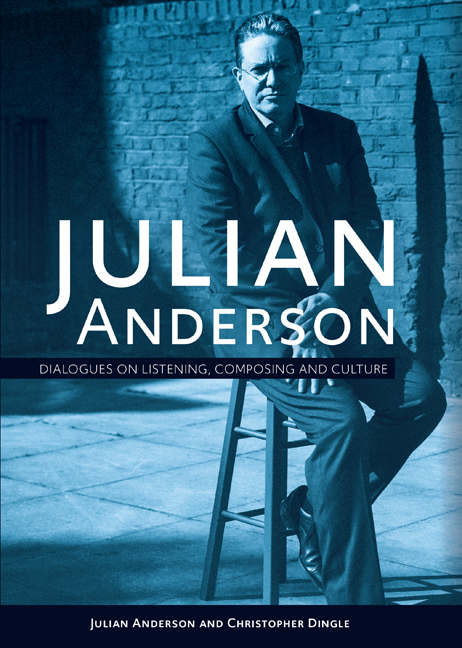Book contents
- Frontmatter
- Contents
- List of Illustrations
- Foreword
- Acknowledgements
- Introduction
- Prelude – Jeux: A Conversation Over Lunch
- Conversation One Origins
- Conversation Two Enthusiasms
- Conversation Three Training
- Conversation Four Dance
- Conversation Five Folk
- Conversation Six Composing (or Not)
- Conversation Seven Understandings
- Conversation Eight Beginnings (and Endings)
- Conversation Nine Puzzles
- Conversation Ten Singing
- Conversation Eleven Olly
- Conversation Twelve Memory
- Conversation Thirteen Opera
- Conversation Fourteen Practices
- Conversation Fifteen Outsiders?
- Conversation Sixteen Quartets
- Conversation Seventeen Advocacy
- Conversation Eighteen Partnerships
- Coda: Multiple Choices
- Chronology
- List of Personae
- Glossary of Musical Terms
- Macrotonality
- Catalogue of Published Works by Julian Anderson
- List of Recordings of Julian Anderson’s Music
- Bibliography
- Discography
- Index
Conversation Seventeen - Advocacy
Published online by Cambridge University Press: 16 September 2020
- Frontmatter
- Contents
- List of Illustrations
- Foreword
- Acknowledgements
- Introduction
- Prelude – Jeux: A Conversation Over Lunch
- Conversation One Origins
- Conversation Two Enthusiasms
- Conversation Three Training
- Conversation Four Dance
- Conversation Five Folk
- Conversation Six Composing (or Not)
- Conversation Seven Understandings
- Conversation Eight Beginnings (and Endings)
- Conversation Nine Puzzles
- Conversation Ten Singing
- Conversation Eleven Olly
- Conversation Twelve Memory
- Conversation Thirteen Opera
- Conversation Fourteen Practices
- Conversation Fifteen Outsiders?
- Conversation Sixteen Quartets
- Conversation Seventeen Advocacy
- Conversation Eighteen Partnerships
- Coda: Multiple Choices
- Chronology
- List of Personae
- Glossary of Musical Terms
- Macrotonality
- Catalogue of Published Works by Julian Anderson
- List of Recordings of Julian Anderson’s Music
- Bibliography
- Discography
- Index
Summary
Anderson's work as an advocate for all sorts of music has surfaced in passing at numerous points in these conversations. Whether as Artistic Director of the Philharmonia Orchestra's ‘Music of Today’ programme for a decade, advice on programming in numerous other settings or through numerous talks, interviews and articles about fellow composers, his straightforward love of all kinds of music is compelling. Rather than detail the specifics of such work, this conversation explores some of the issues and principles involved with advocacy. It starts with dialogue about the intellectualisation of composers and their ability, or otherwise, to articulate. It moves, via some observations on perception, to exploring good and bad practice in speaking to audiences. The benefits of unexpected encounters with works lead to musings about the effort of listening, contemporaneous reception of great masterpieces and changing perceptions of composers.
CD: Many composers, not least yourself, are very articulate when talking not just about their own works, but music and aesthetic issues in general. However, others are not. I’ve been heavily involved with research degrees at the Conservatoire for many years and we have a large number of composers, so I’ve spent many hours supporting them in articulating, through words, the research that resides within their music. Some find that more difficult than others. What concerns me, though, is that it has almost become an expectation now that a composer has to have a PhD to be taken seriously. Is there a danger of an over-intellectualisation of composition? Or, more accurately, where is the space for somebody who is purely instinctive, or is a Satie-esque composer, or a compositional equivalent of Le Douanier Rousseau?
JA: I do worry about that. In one case, there was a composer who was already getting quite a lot of stuff played and wanted to study a PhD with me. After a certain point I had to say to that composer, ‘I don't think you need this at the moment. Continue doing what you’re doing, and perhaps come back later.’ Since then, they’ve become a very successful opera composer. It depends on who you are. In that particular case, I just didn't think it was going to help that composer then.
- Type
- Chapter
- Information
- Julian AndersonDialogues on Listening, Composing and Culture, pp. 340 - 354Publisher: Boydell & BrewerPrint publication year: 2020



